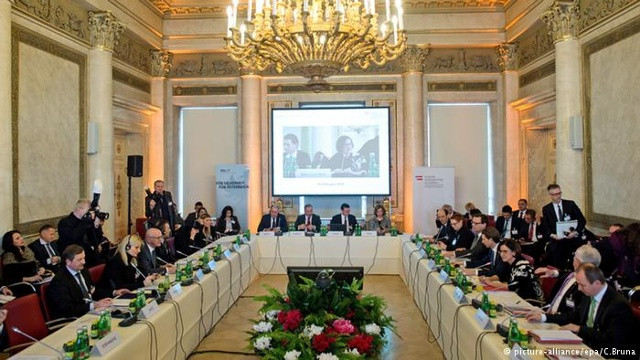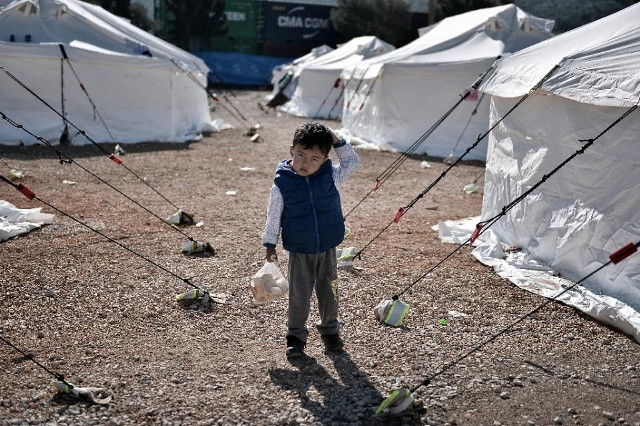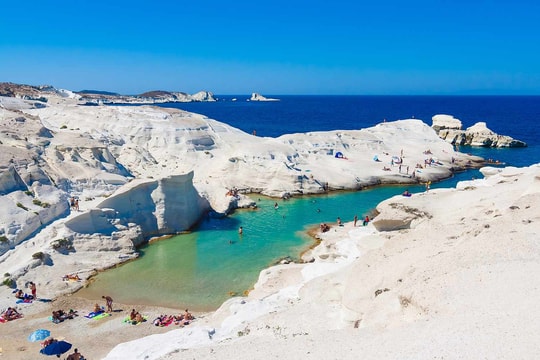Every man for himself!
(Baonghean) - In recent days, Balkan countries and Austria have been trying to shrink back, creating a protective layer to protect themselves. Greece has also begun to "close its doors" to the flow of people from all over the world pouring into the border area. Across Europe, it is easy to see the common point that each country is trying to find its own way to cope. The persistent fight with the migration crisis has invisibly exposed the powerlessness of the European Union (EU) in the face of the current unstable situation.
 |
| A conference between countries along the Balkan route took place in Vienna, Austria on February 24. Photo: epa. |
In that context, in the middle of the week (February 24), a conference was held in Vienna to discuss strategies to reduce the flow of migrants. Leaders from countries along the Balkan route - a path marked by countless footsteps of migrants fleeing conflict and war in recent months - all attended the conference, except for representatives from the two countries at the starting and ending points of the route, Greece and Germany.
This shows that the EU has failed in the migration crisis, when each member state only focuses on its own self-interest, trying to repel refugees and migrants while forgetting the common spirit of the bloc.
The “European solution” that German Chancellor Angela Merkel “drawn” at the most recent EU Summit does not exist. And it will not exist when this female leader meets with representatives from Türkiye at the next Summit on March 7. Because for Ankara, opening the border with Greece and accepting migrants can only happen like an impossible miracle!
No more common ground?
Austria and other countries along the Balkan route are no longer waiting for a change in policy from Berlin, but are starting to act on their own. Macedonia’s border with neighboring Greece is now only open to migrants who can be sure they have come from the bloody war zones of Syria and Iraq. For everyone else, customs officials will shake their heads if they want to pass through.
The Balkan countries only admit that they are “transit stations” for migrants of Syrian origin, and this was bluntly stated by the Interior Ministers of the above countries in Vienna. Currently, apart from the very limited number of 80 migrants who are allowed to be granted asylum in Austria every day, the rest of the country is “pushing” to the leading economy of Europe to receive, adding to the considerable burden that has accumulated for a long time on Germany’s shoulders.
All Germany can do for now is to wait and hope. But what to hope for is also a difficult question for Berlin.
There is no hope for European solidarity in distributing migrants “hitchhiking” through Greece or Türkiye. The numerous meetings between member states held in recent days have clearly demonstrated this.
Without a doubt, EU countries have no other concerns than to protect their borders and “close their ports” to migrants. And the one who suffers the most from such policies is none other than the mythical land of Greece.
Already tangled in the mess of a faltering economy, Athens is even more unable to effectively cope with the burden of thousands of migrants constantly pouring into border hotspots. The Austro-Balkan alliance and the rest of the EU are at risk of pushing Greece into the abyss of collapse and creating a “tragedy” for refugees and migrants.
 |
| A child at a center for migrants and refugees on the outskirts of Athens, Greece on February 25. Photo: AFP. |
"Intimidation" strategy
The calculation behind the decision was made clear by Austrian Interior Minister Johanna Mikl-Leitner last week. Greece cannot and will not take in migrants and refugees. Therefore, it is forced to step outside the EU’s own border mechanism. The EU’s “new border” runs between Greece-Macedonia and Greece-Bulgaria.
Mikl-Leitner said the images of desperate migrants stranded on Greek beaches were meant to deter those who might try to reach the promised land of Europe. She also said that in just a few weeks, people from North Africa, Afghanistan, and even Syria and Iraq will give up the idea of coming to this continent because they know there is no chance of getting to Northern Europe.
According to DW, this is a simple but extremely profound strategy, and is now being applied in Vienna. In response, Greece has threatened to use its veto power to block the Balkan countries of Serbia and Montenegro from accessing the EU.
However, this has not improved the political situation in the region, but only further isolated Athens. The direct victims of this situation are the refugees and migrants who are forced to sleep on the streets of Athens and Idomeni, trapped and unable to return to Turkey, because Ankara also refuses to allow this possibility.
So what will happen? When the Balkan route closes, people will find new routes, perhaps from Greece, through Albania, and then to Italy; or from Libya and Egypt to Italy; and not excluding Turkey to Bulgaria,…
Obviously, closing the borders of each country is not and cannot be a common solution for the EU, and this is also the opinion of the head of the EU border agency - Frontex. This leader also predicted that no matter what, 2016 will still witness the scene of more than 1 million migrants flocking to the old continent, a gloomy future picture is waiting ahead.
Faced with that prospect, ministers in Vienna have also decided to limit the number of people pouring into Europe at all costs, even accepting to trade off and "sacrifice" member Greece, because they are concerned that if they do not do so, the EU will not be able to withstand the current storm.
The cracks in the EU are becoming more and more apparent, and is it because each side has its own agenda when it comes to immigration policy, with everyone only clinging to their own interests?
Thu Giang
| RELATED NEWS |
|---|








